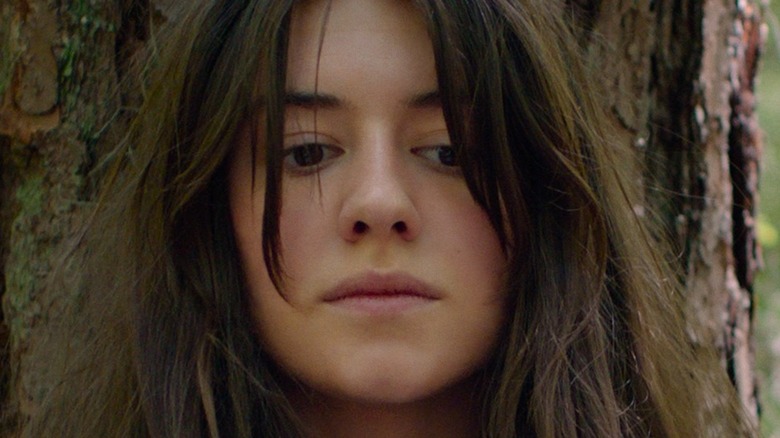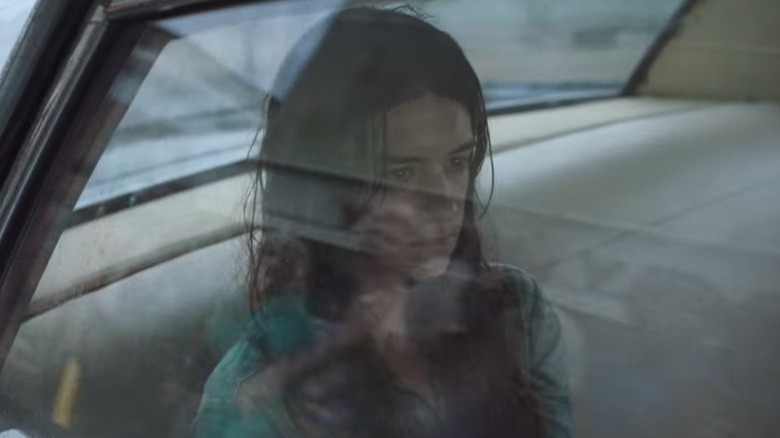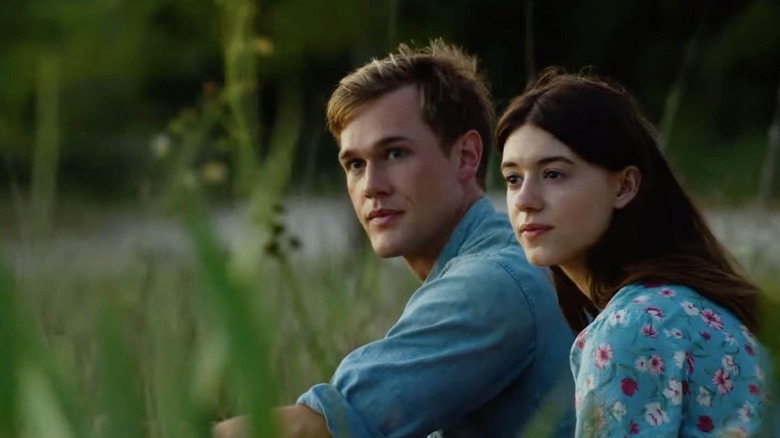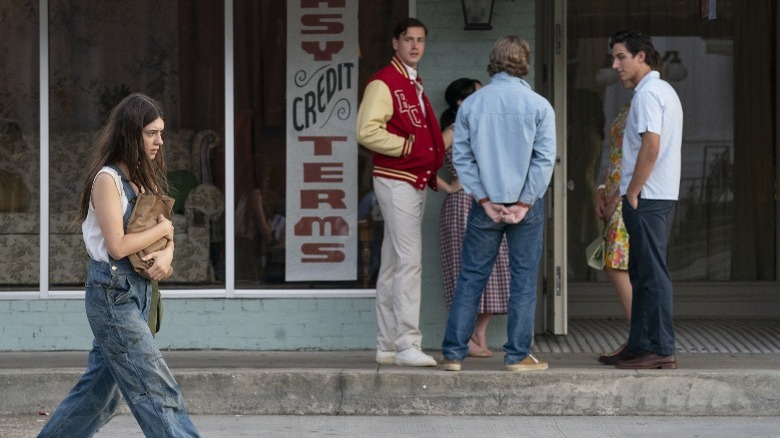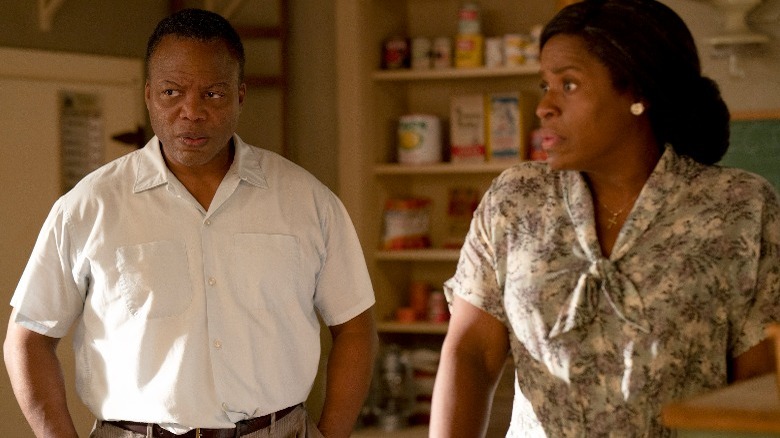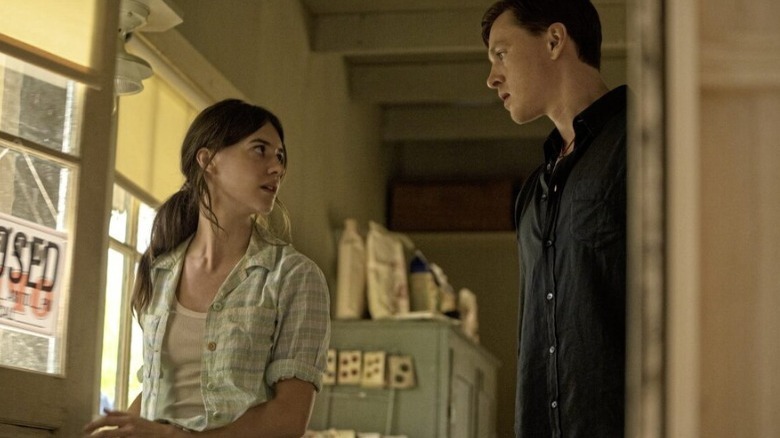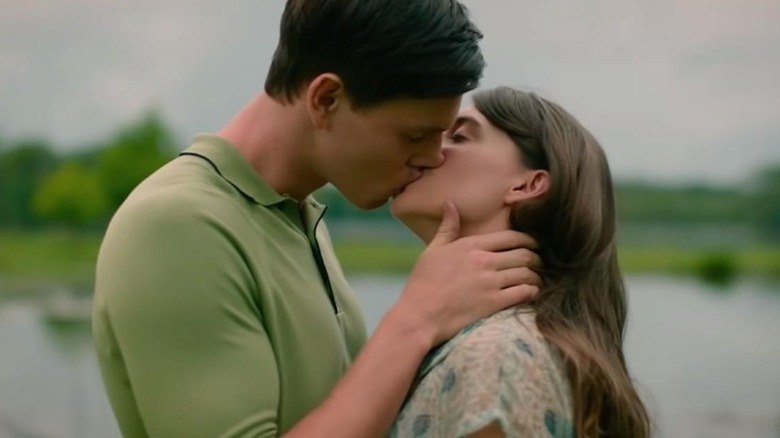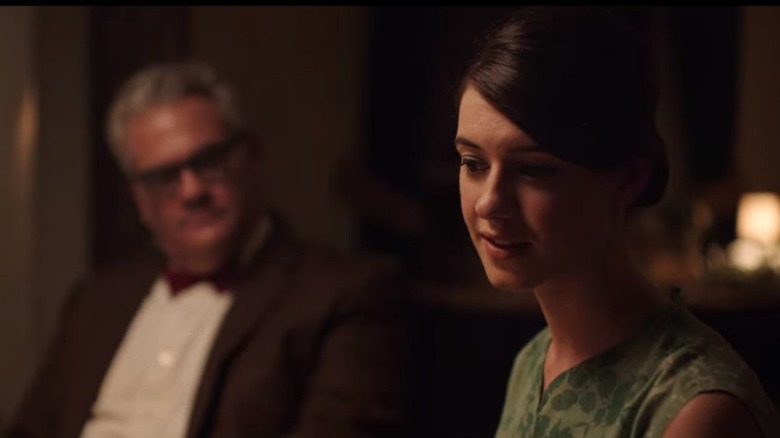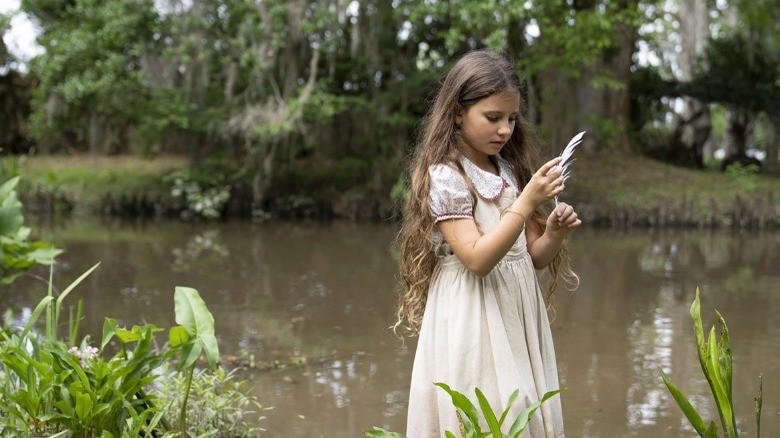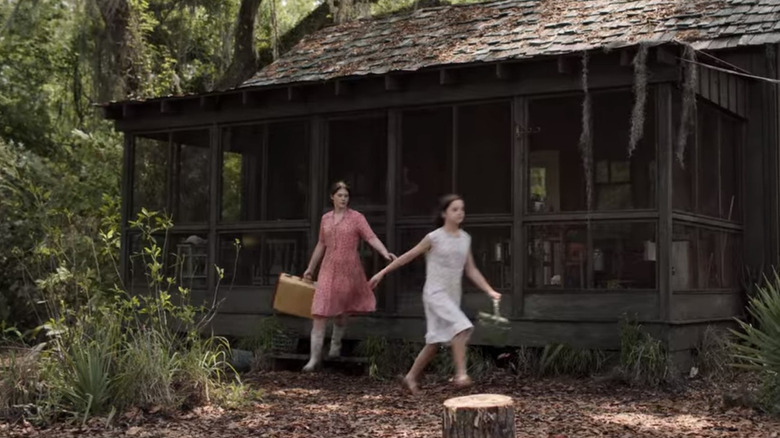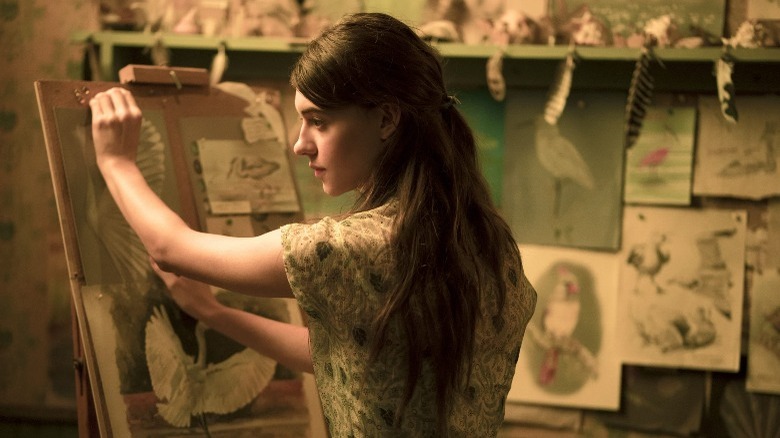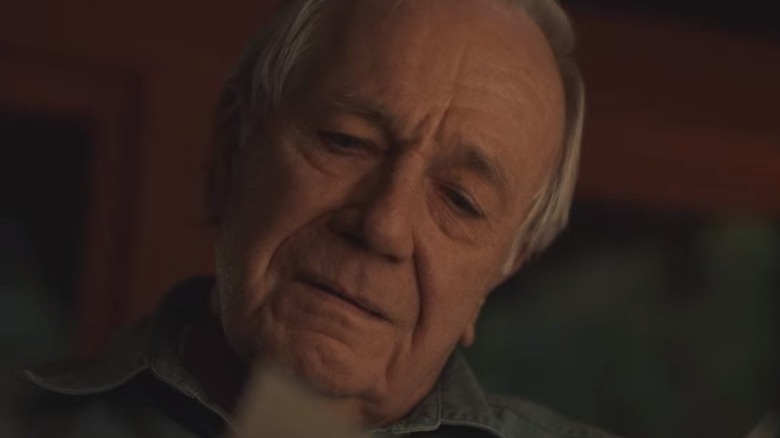Biggest Unanswered Questions In Where The Crawdads Sing
"Where the Crawdads Sing" is a throwback mystery story in a certain sense: like Agatha Christie stories or Sherlock Holmes adaptations, it doesn't unravel the knot at its center until the very final scene. The story of "Marsh Girl" Kya (Daisy Edgar-Jones) is one of tragedy, familial abandonment, and quiet reflection in nature. It straddles the line between period piece, courtroom drama, and murder mystery, and by the end has become something unique. But its ramshackle approach to its own plot leaves more than a few stones unturned in order to deliver the final twist.
Like many other recent movies, "Where the Crawdads Sing" plays with one hand behind its back, and doesn't reveal just how unreliable a narrator Kya is until we've made certain assumptions about her. Due to the popularity of the Delia Owens novel that it's based on, it's likely that a lot of the audience that propelled it to a strong box office showing already had the twist spoiled in advance. This probably explains why the Rotten Tomatoes audience score for the movie is vastly higher than the critics score: if you know the ending, the movie is more about the texture and the performances rather than trying to outguess the plot. But for the rest of us with sticking points, these are all of the unanswered questions in "Where the Crawdads Sing."
Why did Kya run from the police?
"Where the Crawdads Sing" begins with breathless intrigue. A body is found in the marsh, and rumors and a bit of evidence quickly point the finger at our heroine, Catherine "Kya" Clark. As we learn at the very end of the movie (and Kya's life, well into the future), she did in fact lure Chase Andrews (Harris Dickinson) to the top of the fire tower and kill him. She went to elaborate efforts, which we'll get into, to have a solid alibi, and is only tied to the crime scene by the barest of circumstantial evidence.
It's relatively flawless, as plans to get away with murder go, but it begs the question: why does Kya run from the police at the beginning? Although it's in character for the generally shy and misanthropic "Marsh Girl," it seems like a great way to make her appear guilty and sabotage her complicated plot from the beginning. Analyzing her actions in retrospect, it's hard to tell at some points whether Kya is playing 4D chess or just making it up as she goes. Perhaps like Verbal Kint in "The Usual Suspects," it's a combination of both.
Why didn't Tate realize Kya was the killer sooner?
It's unclear what Kya's first — and ultimately final — love, Tate Walker (Taylor John Smith), knows, and when. Presumably like the rest of the town, he assumes after Kya is acquitted that Chase fell to his death in an accident, and only learns the truth when he discovers her writing and the telltale necklace after her death in old age. But it seems impossible that he didn't suspect anything sooner. Tate's one of the few people that knew Chase was abusive and stalking Kya, giving her a much more reasonable motive to kill him rather than being a jilted lover.
Then there's the red hat. Another entry in the canon of significant red clothing objects, fibers from the hat that Tate gives Kya are found on Chase's jacket. Her lawyer convinces the jury that those fibers could have been transferred at a point well before the murder, but Tate alone knows that she didn't have the hat until just before she went to Greenville and Chase was found dead. Did Tate not hear the early parts of the trial when the fibers were discussed? Or does he spend the rest of his life willfully ignoring the evidence?
Why was the town so judgmental of Kya?
"Where the Crawdads Sing" hangs a lot of its central conflict, namely whether or not Kya will be convicted of murder, on the idea that she is very thoroughly despised and ostracized by the townsfolk. When the verdict is read, you half expect everyone's inherent prejudices to win the day, as in a similar courtroom drama like "To Kill a Mockingbird." But instead of deep racial tension, "Where the Crawdads Sing" hinges on everyone hating Kya for ... growing up in the marsh? Liking birds?
Other than some eloquent things that Kya's kindly lawyer Tom Milton (David Strathairn) says in court about not trusting outsiders, the reasons why everyone is instantly suspicious of Kya aren't clear. Her status as an orphan, living alone for years and years, would seem to draw more sympathy than scorn. It doesn't help with the suspension of disbelief that star Daisy Edgar-Jones is never really made up to resemble the half-feral "Marsh Girl" that everyone seems to be talking about. At a certain point, Kya is a beautiful young woman, a published author, and a regionally renowned self-taught naturalist, which is probably more than most town residents can boast. Without a deeper understanding of their psychology, the prejudice against Kya seems to exist just because the story needs it to.
Why didn't Kya have any character witnesses at the trial?
As the trial unfolds slowly over the course of "Where the Crawdads Sing" and we learn more and more through flashbacks, you start to wonder how charges were even brought against Kya in the first place. It doesn't take long to get past the "Marsh Girl" mystique and see that Kya is a traumatized, painfully shy person who seemingly wouldn't hurt a fly. But the only witnesses at the trial that we see are the local police, as well as Chase's mother, to really color the perception of the jury. Except for her lawyer, no one that knows Kya takes the stand to testify that she's an unlikely murderer.
Even if she doesn't want to testify in her own defense, it would make sense to have Tate or her kind surrogate parent figures, the Madisons, appear at least as character witnesses. When they all appear in court to support Kya near the end of the trial, it only makes you wonder where they've been the entire time. Conversely, it's strange that it doesn't at least come up in court that Chase was engaged the entire time he pursued Kya.
Why didn't Kya testify about Chase's abusive behavior?
It doesn't become truly clear until the end why Kya doesn't take the stand herself during the trial. Since she actually did kill Chase, it's likely that she doesn't want to risk accidentally giving herself away during questioning, in addition to her stated reasons for not wanting to open herself up to the further judgment of the jury. But the nagging question still remains: why doesn't she testify at least about Chase's attempted sexual assault in order to explain the incident on the beach? In general, it seems like her plan leaves her version of the story as woefully incomplete.
It would at least behoove her defense to establish that Chase was known by several people in town to act generally drunk and restless, and had been particularly unhinged in the days before his death. This would make it easier to buy that he just fell off the fire tower on his own as well. In any case, the way that "Where the Crawdad Sings" parses out information makes the courtroom scenes more of an afterthought than similar scenes in all the best lawyer movies.
How did Kya kill Chase?
After hours of mystery and tension, and after Kya's death from old age, we finally learn the truth: she killed Chase after all. But how? The movie has so much invested in the moment of Chase's death that it's almost criminal not to flash back to it when the twist is finally revealed. Unlike, say, "No Country For Old Men," which has multiple pivotal deaths occur "off-screen" to emphasize a story that's chaotic in theme, "Where the Crawdads Sing" is wholly centered around one pivotal murder, and then flashes back to everything except the murder itself.
It's also a lost opportunity to see Kya in her moment of "victory," and to learn more about the character in the way that she's depicted. Did she lure Chase to the fire tower by pretending to be receptive to his advances again? Did her resolve ever break or was she steadfast and cold about doing what she felt she had to do to survive? It's a missed opportunity for Daisy Edgar-Jones to play a tightly wound character finally snapping as well. In the end, as fun as the big twist is, "Where the Crawdads Sing" is the kind of movie where the climax is a deleted scene.
How did Kya get back from Greenville undetected?
Even more than Chase's death itself, many questions remain about Kya's elaborate plot to pull off the deed while maintaining her alibi in Greenville. When "Where the Crawdads Sing" reveals that she did, in fact, secretly take a bus back to town in the dead of night, wipe the fire tower clean of evidence, and then secretly return to Greenville, it doesn't bother to show us any of it. You're telling us the meek, tortured "Marsh Girl" turned into Jason Bourne for a night and we don't get to see it? Preposterous.
What sort of disguise did Kya wear to avoid being remembered by either bus driver? How did she manage to find Chase, lure him to the fire tower, knock him off, and then cover her tracks in the span of an hour? How easy or hard was it for her to gather herself in the morning and appear visibly undisturbed by this entire experience to her editor? It's a bit hard to buy into the movie's thematic comparison of Kya to a praying mantis (the female of which kills the male after mating), when we don't get a chance to see any part of her revenge exacted or the efforts it took to get it.
Why isn't Tate also a suspect in Chase's murder?
While Kya would obviously not bring any of it up, it seems strange that Tate isn't a natural suspect for the authorities in Chase's murder. After overhearing Chase talk dismissively about Kya, he and Tate nearly come to blows in front of plenty of witnesses, so the animosity between them would be a public fact. Tate also happens to be wearing the telltale red cap during that confrontation, which leaves fibers on Chase's jacket. The local police seem to just arrest Kya and promptly stop even asking any questions about other likely suspects.
On the one hand, you have a socially isolated "Marsh Girl" who has never been known to hurt anyone and was in Greenville on the night in question. On the other, you have a much better physical threat to Chase in Tate, who's openly confrontational with the murder victim and was actually in town on the night in question. It seems like it could just as easily be Tate on trial instead of Kya, since the only evidence (from the red hat) implicates both of them.
How did Kya raise herself all alone?
Orphans always make for compelling main characters. They struggle alone by default against the perilous and strange world. Orphans make great superheroes and terrific protagonists in coming-of-age stories, like Kya. But "Where the Crawdads Sing" spends precious little time on the actual logistics of how Kya managed to raise herself alone in the marsh after being orphaned at a very young age. Other than establishing that she sells mussels to the Madisons for a little money, the specifics of how Kya survived on her own for 10 years is a mystery.
What happened when she got sick? How did she stay sane alone in the marsh for years, unable to even read to pass the time? Did she spend major holidays with the Madisons at least? How did she dodge CPS so consistently for so long? It also seems a little hard to believe that the property tax issue wouldn't come up for so many years, and that the state and bank would be so chill about forgiveness when it finally does. The plight of an orphan is such a universal hook that the story of how Kya lived alone is actually sort of more interesting by default than the story of how adult Kya learned that some men are creeps.
What happened to the rest of Kya's family?
Kya sees a vision of her mother in her dying moments; she's clearly defined in many ways by the abandonment of her family. "Where the Crawdads Sing" gives her partial closure when she reunites with her brother Jodie (Logan Macrae), who also informs her of their mother's tragic death from leukemia. But no mention is made of their father Jackson (Garrett Dillahunt), or their two older sisters either for that matter.
Obviously the disappearance of her drunken, abusive father is a relief to Kya, but she must have been haunted by the possibility of his return. Since the story speeds up so rapidly at the end and goes straight to Kya in old age, we don't learn if she ever heard from her sisters, or how her fractured family life played into her decision to never have children of her own, or to never get officially married.
Does Kya ever date anyone else?
As far as we can tell, Kya is only ever with two men: Tate, Chase, and then Tate again (until death does them part, as they say). "Where the Crawdads Sing" is ostensibly Kya's story, and traces her journey from an abandoned and frightened child to a fiercely independent adult woman: in a sense, it's a letdown how much of that story is defined by these two foolish men. Did Kya date anyone in between the two, during the five years that Tate was away and Chase pursued her?
In general, one of the hardest things to square in "Where the Crawdads Sing" is the way that the "Marsh Girl" is viewed as such an unwelcome outsider despite, you know, having the beautiful looks of breakout "Normal People" star Daisy Edgar-Jones. There's only so much dirt you can get on yourself in the marsh: why wasn't she beating all of the men in town off with a stick?
Does Tate ever get tired of living in the marsh?
The most unique part of "Where the Crawdads Sing" is that it gives us glimpses of its entire "happily ever after" ending, showing us Kya and Tate growing old contentedly together in the marsh, before delivering its final twist after Kya's death. But without any more voiceover from Kya, unlike the flashbacks that make up most of the movie, we don't get a real sense of what that life together was like other than the fact that Kya and Tate seem visibly happy. This does bring up natural questions about how content they were, with their lives more or less frozen in place: Tate pursues science while Kya follows her talents for art and nature writing, and both seem happy to never officially wed or have children.
But how does Tate deal with leaving his entire life behind to go live essentially in the wilderness? Does the house ever even get proper plumbing or electricity? Does Tate miss his family? Does living so remotely ever get in the way of his career? In the very end, he's devoted enough to Kya's memory to choose not to reveal her secret. But beyond his mother and sibling's death, we don't get a real sense of what makes Tate tick.
